Chizky Turnheim
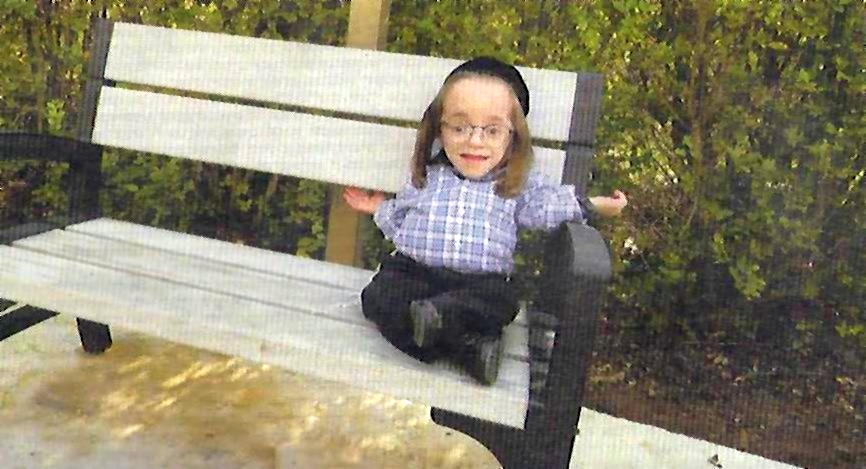
"Greetings to you, dear principals. My name is Chizky Turnheim and I am nine years old, in the sixth grade. If my principal were to look at my physical form rather than at my actual capacity, I wouldn't have reached my high achievement. Handicapped children would also like to succeed like me, so remember: It isn't the physical body which is the limiter. It is the ability which counts!"
In a very confident and clear voice, Chizky, a student in the Breslav cheder in Modi'in Illit, suffering from a unique, incurable disease, succeeded in conveying an incisive message which was shown in the recent Chinuch Conference and has since become a model for principals, teachers and parents coping with various problems.
Hundreds of educators and mashgichim in chadorim, schools and yeshivos throughout the country viewed this Chassidic boy, pure of countenance, his face framed by curly payos, who was filmed seated on his specially designed seat, thanking the only principal who agreed to accept him as a regular student despite the severe handicap which endangers his very life literally every moment. The boy called upon everyone to take his example and enable handicapped children to emerge from their external casing and prove to all that not only does the outer form conceal an exalted soul and hidden capacities within, but that it does not negate social and academic involvement with the outside environment, as has been denied such children, himself especially, for year after year.
Chizky
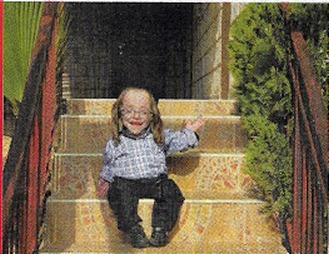
The video clip was created by his uncle, Rabbi Nochum Hoffman, an educational advisor and pedagogical administrator in a Chinuch Atzmai Teachers Institute, expressly for the meeting dedicated to the integration of the special child into a normative class. This part of the Fourteenth Chinuch Convention under the guidance of Torah leadership and in conjunction with the Teachers Institute under the administration of Rabbi Kleers, was geared to convey the latest good news that has already been implemented in the northern region of Israel which enables parents of handicapped children to decide in which institution they wish to enroll their child while being eligible for the various benefits to which they are entitled. He successfully demonstrated how one picture was worth more than a thousand verbal explanations.
A powerful voice emerged from the diminutive body which was all but lost in a heavy metal seat. Here was the cry of a child fighting all the ignorance and stigma imbedded in the educational system in the past, pleading in the name of hundreds and thousands of children whose parents lack the mettle and power to battle against bureaucracy to give their child as many tools as possible to be like normal children. Don't look at the shell! Look past the flaws and external disfigurement and don't give up on me and others like me.
Chizky in the classroom
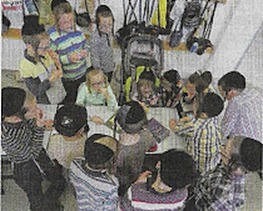
"it was very moving," says Chizky to Yated Hashavua. "I received a lot of feedback from people who were fortified by my words, and I felt that Hashem had given me the privilege to be a public messenger, as if I were speaking not only for myself but for so many others in a similar situation."
"To be in a state of happiness," represents the essence of the Turnheim family coping with a challenging test requiring a round-the-clock vigil on Chizky, who was born with Osteogenesis imperfecta (OI), also known as brittle bone disease, which is a group of genetic disorders that mainly affect the bones. It results in bones that break easily. The severity may be mild to severe. The bones lack collagen, making them prone to fracture from the slightest pressure or blow.
In severe cases, of which Chizky is one, the patients' bones are malformed, besides being extremely fragile, and most children do not survive beyond infancy. Chizky is considered a miraculous exception to the point that he is the only one in the world still alive at his age (9).
"When Rafael Chizkiyah was born, we didn't know how to accept it. The doctor in Kupat Cholim couldn't even pronounce his illness, so rare was it. We were shocked at the severe degree of his condition," the mother once said. "He was diagnosed with the second out of four degrees of natal fractures preventing his limbs from developing to normal length."
Chizky's chalakah with the Admor of Weblarge lerefuah sheleimah
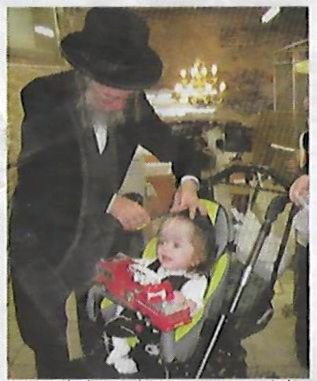
Chizky is the one and only child in the world at this degree of illness, and still alive at his age. Any improper touch, even handshake, can cause fractures and complications. A ball hitting him by mistake is life threatening. Since two months old, when he suffered from a virus, he has needed oxygen respiration. He has an opening to breathe which Chizky covers up when he really wants to say something through his mouth.
"Chizky is the proof that one must never give up on a child or take doctors' doomsday prognoses. At first, they hinted to us before he was born that it was futile to expect anything and that at best, he would be a piece of meat lying in a bed, no more," says Rabbi Turnheim, a well known educator and a maggid shiur in a yeshiva in an interview. "When he contracted a virus at two months, the doctors advised us to `let nature take its course'. We consulted the Sadigura Rebbe who sent us to Professor Weintraub, head of pediatric orthopedics in Ichilov. He said that if respiration was a chance for the child to remain alive, it should be administered. It was a critical split second decision which we made. I signed for it and since then, he has been on a respirator day and night.
Chizky with HaRav Chaim
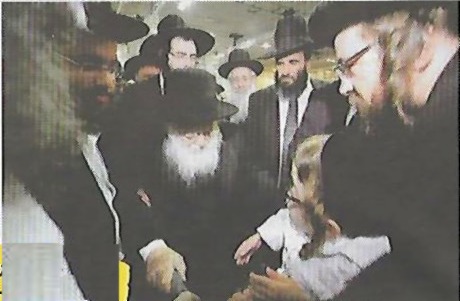
"He was hospitalized in Alyn for a year-and-a-half. When he was two, we organized all the necessary medical equipment and he came home. Slowly, he was able to be weaned away and only needs respiration at night. We have an intensive care room at home and everything he needs in order to be able to leave the house. We are determined not to keep him hidden away at home, which is not good for him or the family. We are resolute to conduct a normative life to the best of our ability," says Rabbi Turnheim.
"Now it is hard to believe what a black future they predicted for our Chizky, the boy with the biggest ambitions and tremendous abilities, who gets 100 on every test, who is already learning perek Hakoness and plans to finish Shas!"
He has a special relationship with HaRav Chaim Kanievsky and is very attached to him. One of the volunteers, whose father is one of HaRav Chaim's household, makes sure to take him in to HaRav Chaim from time to time to get a brochoh. HaRav Chaim calls Chizky a special boy and makes a point of giving him a brochoh.
Chizky at a simchah
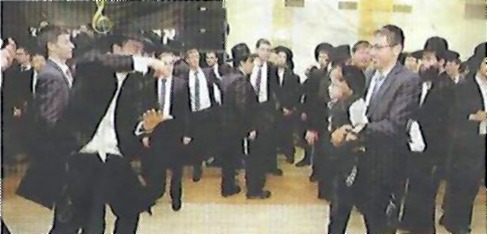
Rav Turnheim has a message for other families who are dealing with a child with disabilities of limitations: "It is important not to hide but to seize the task that Hashem has put to us in life. When Chizky was born we decided to develop him to the maximum of his abilities but to raise him in a way that will not harm anyone else in the family. So he is growing up as a part of the family.
"I have astounding stories about the hand that helps us from Shomayim in every stage of our care for Chizky. Hashem gives a nisoyon only to those who have the ability to pass them and no parent should ever give up. Even if all seems black."
"In his first year, we could not hold him at all. He was born with 50 broken bones in his chest and he had to stay on a pillow all the time. Little by little they taught him to move his hands and feet and to improve his independence on a wheelchair. He needs someone in attendance at all times and boruch Hashem we have a lot of volunteers who are very dedicated to him. But it is very hard since sometimes he must be watched intensively.
"You have to understand that Chizky's condition is very complicated and very rare and very limiting. It is so rare that often we know more about what is going on than the doctors. A lot of times when he breaks a bone we just take care of him at home since there is no point to go to the hospital.
Chizky
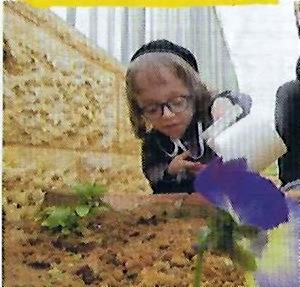
There were a lot of struggles along the way, but the most painful one, which really brought a lot of attention, was the battle with the chinuch system about his basic right to learn in a class in an institution that is appropriate to his abilities, especially the Torah and spiritual needs that his soul requires. At the early stages, Chizky had to compromise on a school that only cared for his physical needs, in the company of families that were not religious.
"From the beginning it appeared that his special needs that require constant supervision would not allow him to learn in a regular school. At first he was in Alyn, a special school of which there are only 2 in Israel, where he learned to move his limbs, to eat and other basic functions.
At a certain point, the situation became unbearable, and his parents began a battle that, against all odds, and using every string they could pull and every possible channel, led to his entry into Meshi, a chareidi school for special education.
Two years later, this had been used to its maximum, and his parents decided they had no choice but to open a new front to get Chizky into a regular cheder. His medical condition, including his need for daily suction, scared all the principals and they received one rejection after another. Empathy, courtesy, but unequivocal refusals. They were all afraid to start up with such a case.
One time the municipal psychologist proposed that they invite all the children of the class they hoped to place him in, to his home. He asked the parents to meet him on his own ground. The parents all refused. They were afraid that seeing all the equipment and medicine in what seemed like a field hospital would be worse than if he suddenly came to school.
A ray of light appeared in the person of the principal of the Breslav cheder in Chizky's own neighborhood. Rav Nachman Koenig agreed to try one day a week for a few hours — and it worked out well. Then they tried another day and another, and now for four years the rest is history. Chizky is a tremendous success story, a model for others.
The two great worries were social issues and scholastic issues.
The social issues turned out to be nonexistent. Chizky is very well liked and he is a full participant in everything. He is sharp and funny and the center of attention.
The scholastic issues turned out to be real — but in the opposite direction. Chizky was too smart for the class. He had to skip a grade and now he is the youngest in his class and nonetheless gets high grades.
The main lesson there is to be learned is that parents should step up and take responsibility. Sometimes the experts say one thing, but parents also have a right to an opinion that needs to be respected.
The system should learn from what Chizky says: Don't look at the body, but at the abilities.




